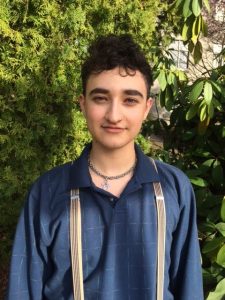The Nature Equity Educator position was created to help Hoyt Arboretum provide more programmatic opportunities to communities throughout the Portland metro area. In the past few years, our youth education programs have reached students across the region and the most recent Nature Equity Educator role has expanded that work. With the help of people like Junø and organizations like the Confluence Environmental Center, we’re working to get closer to creating a more equitable park for all Portlanders.
Hello and Goodbye!


As a disabled educator and environmental justice advocate, I am motivated by interrupting the widely-held belief that “Nature” is something separate and at odds with humanity. This false dichotomy has perpetuated an addiction to extracting material and symbolic wealth from the land, a direct reflection of the extraction of Black and Indigenous people from their homelands. This commodification of nature and people is tied to the disproportionate number of marginalized folks without adequate access to local green spaces. Working remotely posed an opportunity to manage my chronic pain from the comfort of home, while generating ideas for a decolonized virtual nature curriculum.
Working remotely posed an opportunity to manage my chronic pain from the comfort of home, while generating ideas for a decolonized virtual nature curriculum.
Bridging the shift in “classroom” from ripe earth to a sensorily deprived virtual space was challenging; there’s a dissonance between what’s accessible for those with technological resources and those without. Still, I endeavored to frame the mutually beneficial relationships that exist in nature as models for community care. I catered to different learning styles on Zoom by infusing programs with somatics and supplementary educational content like multimedia collages. I led our preschool Tree Time program (Mondays, 10am-11am) with varying themes every week, Blooming Trees & Pollinators in the spring, a monthly two-part youth Bird Nerd workshop, Nature Exploration Wednesdays, a youth research facilitation program, and an Interspecies Communication webinar for adults. I was elated by the participation of over 100 attendees since March. A parent of two Tree Time attendees remarked, “[the kids] started a game of cloud spotting today . . . [they have been] taking pictures of the dinosaur plants, collecting seeds as we walk, and helping out in the yard to make sure our plants are happy . . . they feel a stronger concern and responsibility for the living things around them.”
In order to truly embed equity into my work, I needed to put some of my loftier program ideas on hold, and ground deeper into my own network of mutual aid and care exchange.
While this work is deeply rewarding, it had unfortunately come at the price of a fibromyalgia flare-up: the result of how I had internalized capitalism by equating my worth with my productivity, even if it was for a good cause. In order to truly embed equity into my work, I needed to put some of my loftier program ideas on hold, and ground deeper into my own network of mutual aid and care exchange. Whether someone’s working from home and/or taking to the streets to protest police brutality, agency stems from one’s ability to set boundaries to prevent burn-out. This is what has kept the protests in Portland alive for over 75 days. Real change is lasting, but it requires sustainability to be more than a hashtag reserved for “ethical” extraction; it is an innately anti-capitalist framework for existing in symbiosis with ourselves and the world around us.